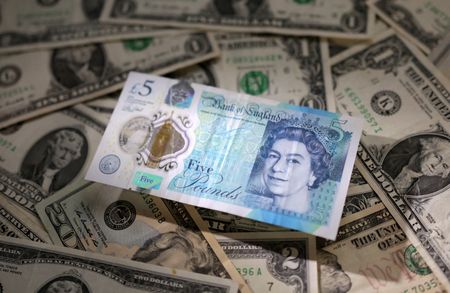By Greta Rosen Fondahn
(Reuters) – Sterling looked lacklustre against the dollar on Monday as a survey reported a decline in domestic UK business confidence and traders digested a recent Federal Reserve-induced rally in the greenback.
British business confidence fell to its lowest level of 2024 in December, although employers were a bit more optimistic about the wider economy, according to a survey published on Monday.
GDP figures on Monday also showed that the British economy flat-lined in the third quarter of the year, revised down from an earlier estimate of 0.1% growth.
“Our hunch is that 2025 will be a better year for the economy than 2024. But more recent data suggest the economy doesn’t have much momentum as the year comes to a close,” said Paul Dales, chief UK economist at consultancy Capital Economics in a note.
On Friday, the pound touched a one-month low of $1.2475, before it turned direction and closed the day 0.5% higher versus the greenback, after a busy week of central bank action.
Sterling struggled to sustain that rebound on Monday and was last down 0.18% versus the dollar at $1.2544.
The Bank of England held interest rates steady on Thursday, but the central bank’s Monetary Policy Committee was more split over the decision than markets had expected.
Traders now price in roughly 56 basis points (bps) in rate cuts next year, compared with around 45 bps just before the decision.
Across the pond a hawkish Fed in contrast lowered rates as expected on Wednesday but signalled caution ahead, spurring a rally in the dollar, with the dollar index closing the week 0.8% higher.
The pound, one of the year’s best performing major currencies against the dollar, is now down 1.45% year to date versus the greenback.
The euro edged slightly lower against the pound on Monday, with one euro at 82.90 pence.
European Central Bank President Christine Lagarde said the euro zone was getting “very close” to reaching the ECB’s medium-term inflation goal, according to an interview published in the Financial Times on Monday.
In a holiday-curtailed week, trading volumes are likely to thin out as markets ready for the start of next year.
(Reporting by Greta Rosen Fondahn, Editing by William Maclean)









